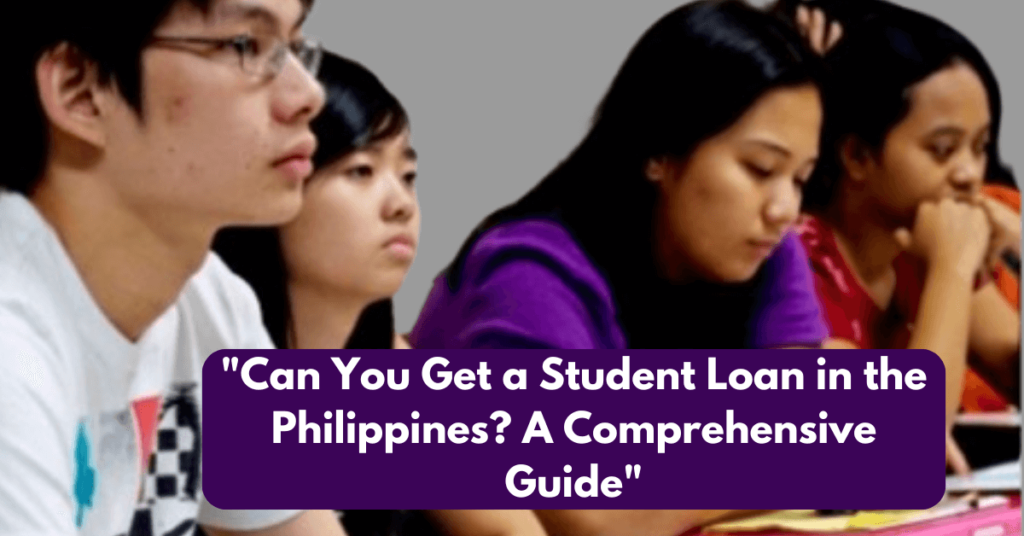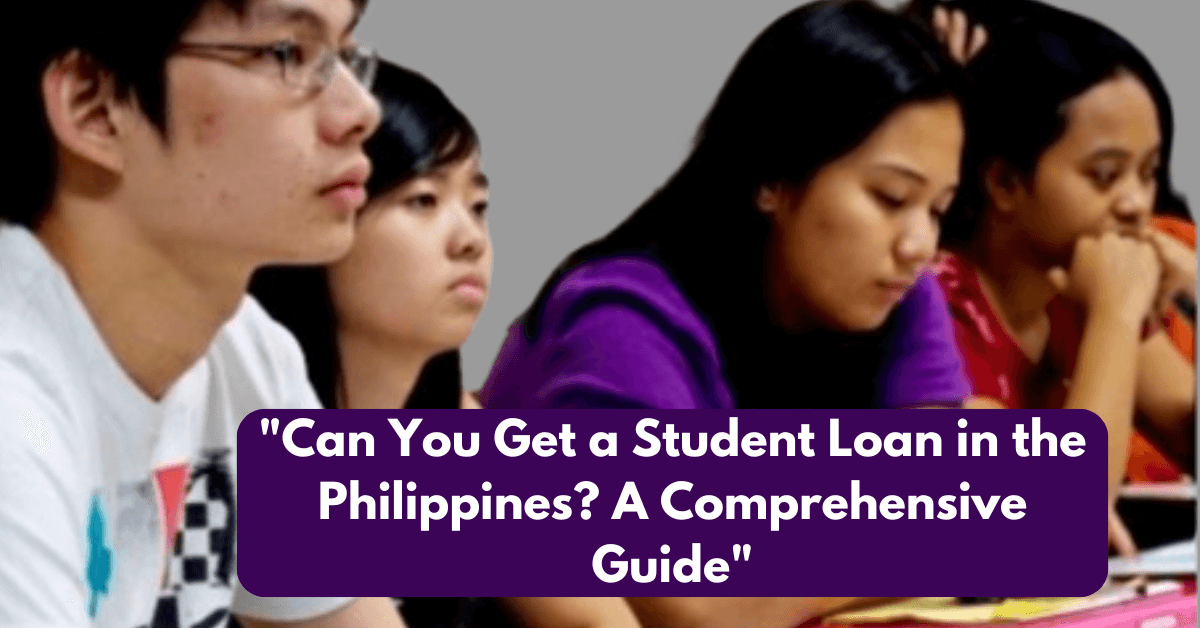“Can You Get a Student Loan in the Philippines? A Comprehensive Guide” Access to quality education is a cornerstone of personal and national development. However, for many families in the Philippines, the rising cost of education can be a significant barrier. Thankfully, student loans are available to help bridge this financial gap. In this article, we’ll explore whether you can get a student loan in the Philippines, the types of loans available, the application process, and practical tips to make the most of these financial resources.

Understanding Student Loans in the Philippines
The short answer to the question, “Can you get a student loan in the Philippines?” is yes. The country offers various student loan programs designed to assist individuals in pursuing their educational goals. These loans can be accessed through government programs, private financial institutions, and even non-governmental organizations (NGOs).
Student loans provide a way for students or their guardians to pay for tuition, books, and other educational expenses with flexible repayment terms. They are especially beneficial for those attending private universities or studying abroad, where costs can be higher.
Types of Student Loans Available in Philippines
- Government-Backed Loans
The government of the Philippines offers educational loans through agencies such as the Social Security System (SSS), Government Service Insurance System (GSIS), and the Development Bank of the Philippines (DBP).- SSS Educational Assistance Loan Program: This program is aimed at SSS members and their beneficiaries. It allows members to borrow up to PHP 20,000 per semester to cover educational expenses.
- GSIS Educational Loan: The GSIS provides loans to government employees, which can be used to fund their children’s education.
- CHED Student Loan Program: The Commission on Higher Education (CHED) runs a short-term student loan program targeting low-income families.
- Private Bank Loans
Major banks in the Philippines, such as BPI, BDO, and Metrobank, also offer student loans. These loans often have higher borrowing limits than government loans but may come with stricter eligibility requirements. - Institutional Loans from Universities
Some universities and colleges provide in-house loan programs for students. These loans are typically interest-free or have very low interest rates and are repaid after graduation. - Non-Governmental and Cooperative Loans
NGOs and cooperatives, like PAGASA Philippines, also extend student loans. These organizations often target underserved communities, offering flexible terms to make education accessible.
How to Apply for a Student Loan
1. Determine Your Needs and Loan Type
Before applying, calculate the amount you need for tuition, books, and living expenses. Choose a loan program that aligns with your needs and repayment capabilities.
2. Meet Eligibility Requirements
Different loan providers have different eligibility criteria. These may include age limits, academic performance, and financial status.
3. Prepare Necessary Documents
Commonly required documents include:
- Proof of enrollment or admission
- Identification documents (e.g., valid ID, birth certificate)
- Proof of income for guarantors or parents
- Academic records
4. Submit Your Application
Applications can usually be submitted online or in person, depending on the provider. Ensure all details are accurate to avoid delays.
5. Wait for Approval
Approval times vary depending on the lender. Government loans may take longer than private loans due to processing protocols.
Advantages of Student Loans in the Philippines
- Affordable Interest Rates
Many student loan programs, especially those offered by the government, have low-interest rates to minimize the financial burden on borrowers. - Flexible Repayment Terms
Repayment can often be deferred until after graduation, giving students time to find stable employment before starting payments. - Wider Access to Quality Education
By bridging the financial gap, student loans enable students from low-income families to access private or higher-tier universities.
Challenges of Student Loans
While student loans are a great financial tool, they come with challenges:
- Limited Availability
Some programs are limited to specific groups, such as government employees or SSS members, excluding other potential beneficiaries. - Lengthy Application Processes
Government loan applications can be bureaucratic and time-consuming. - Repayment Obligations
Borrowers must ensure they can repay the loan to avoid financial strain post-graduation.
Tips for Maximizing Student Loans
- Borrow Only What You Need
Overborrowing can lead to unnecessary debt. Stick to the essentials when calculating loan amounts. - Understand the Terms and Conditions
Read the fine print and understand the repayment terms, interest rates, and any penalties for late payments. - Plan for Repayment Early
Start planning your budget to accommodate loan repayments after graduation. Early financial planning can help prevent default. - Explore Scholarships and Grants
Supplement your loan with scholarships or grants, which do not require repayment. This can significantly reduce your financial burden.
FAQs About Student Loans in the Philippines
Q: Can you get a student loan in the Philippines as an international student?
Most student loans in the Philippines are tailored for Filipino citizens. However, some private institutions may extend loans to international students with specific requirements.
Q: Are there loans for vocational or technical courses?
Yes, many government and private programs also cater to vocational or technical courses, recognizing their importance in workforce development.
Q: What happens if I can’t repay the loan?
Defaulting on a loan can result in penalties and negatively impact your credit history. Some government loans offer restructuring options to help manage repayment.
Conclusion
So, can you get a student loan in the Philippines? Absolutely! From government programs to private institutions, there are numerous avenues to secure financial assistance for your education. By understanding the types of loans available and carefully managing your finances, you can achieve your academic goals without undue financial stress. Student loans, when used wisely, are a stepping stone to a brighter future.

